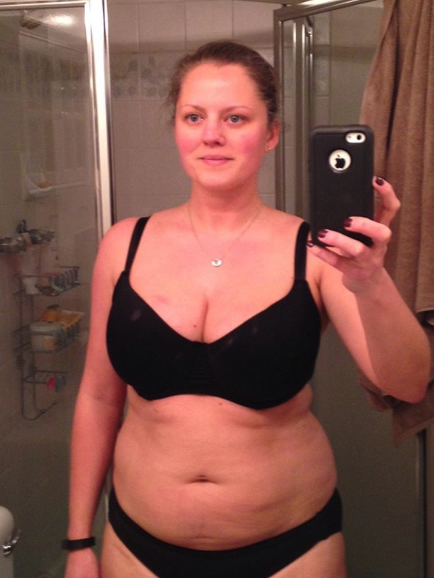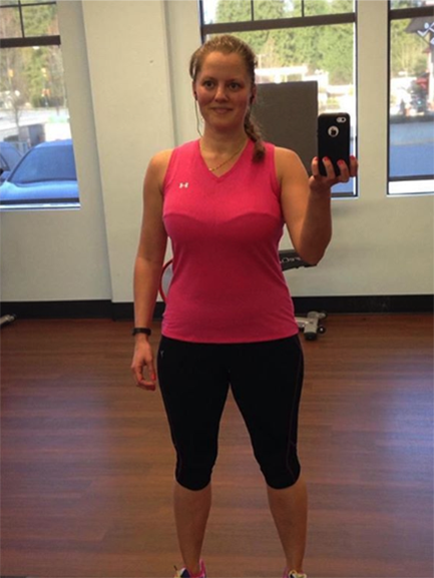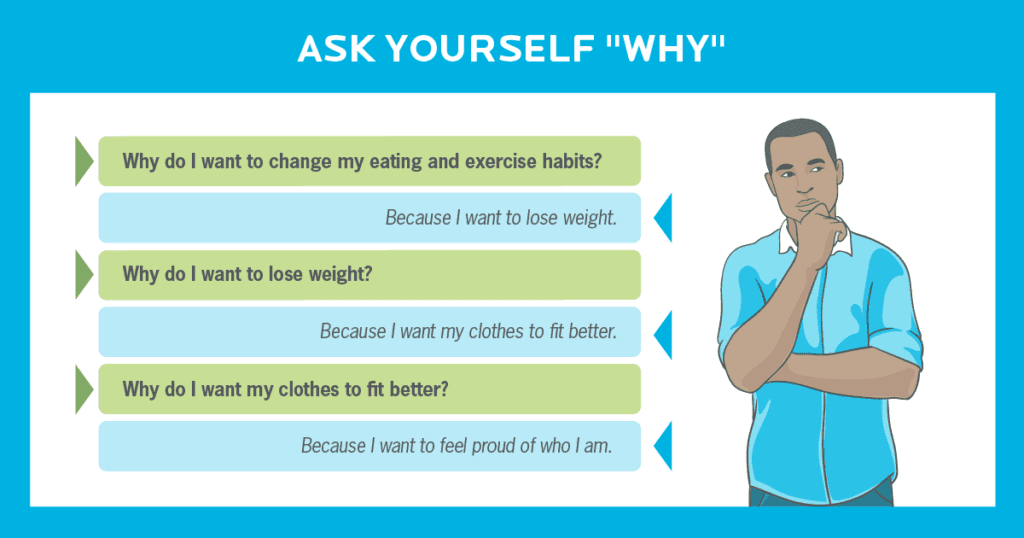Ever feel like the body you want is always just out of reach? Like you’ll never quite be lean, strong, fit, or healthy enough? Or that there’s always somebody “better” than you? Here’s how to stop hating on your body, and free yourself from the frustration of constant comparison.
++++
Caron Adderley lost 55 pounds over the course of 11 months.
And for a short period, she felt happy with those results.
While her family and friends (and the rest of the world) saw her as perfectly fit, she soon became dissatisfied. “Even though I was leaner than ever, I now wanted six-pack abs,” says Caron.
After all, truly fit people have washboards, right?
But no matter how lean or strong she became, or what new goals she achieved, there was always someone “better” to compare herself to.
Instead of appreciating her own progress, she kept wanting more.
Sound familiar?
In 10 years of coaching, I’ve come across countless stories like Caron’s. Both men and women.
Regardless of where you (or your clients) are in your health and fitness journey, it’s common to feel like:
- You’re never quite where you want to be.
- Everyone else is doing better than you.
- Even your best effort just isn’t good enough.
I call this the comparison game.
And if you’re stuck in it, you know how soul-sucking it feels.
But you don’t have to keep playing. (Nor do your clients.)
In this article, we’ll explain why you can’t stop constantly comparing yourself to others—and why it always feels like you’re not measuring up. (Spoiler alert: It’s completely normal, according to science).
More importantly, we’ll give you five strategies that’ll help you conquer your comparison complex for good—because a healthy lifestyle should lift you up, not bring you down.
++
A secret about comparison: Everybody’s doing it.
It’s human nature to compare ourselves to others.
Back in the 1950s, famed psychologist Leon Festinger, Ph.D. coined the term social comparison theory.
The idea: In order to gauge our “success” in any given area of life—career success, intelligence, and yes, appearance—we look to one another for points of reference.
But we don’t look to just anyone.
We compare ourselves to our “relevant peer group,” says Karen North, Ph.D., clinical professor of communications at the University of Southern California.
This group, explains Dr. North, is made up of people we perceive to be around our same level in any given attribute.
For example, if you’re a high school basketball star, you’ll likely compare yourself to the top players in your district, rather than NBA all-stars.
Now, it’s probably no surprise that your friends, neighbors, and colleagues typically fall into your comparison bucket.
But you can also be influenced by people you have no clear connection to, like a movie star, CrossFit champion, or Instagram influencer.
“Celebrities can become part of our peer group to the point we feel we actually know them,” says Krista Scott-Dixon, Ph.D., Director of Curriculum here at Precision Nutrition and an expert in counselling psychology.
“Think about how you might binge-watch a Netflix series and become attached to the characters,” she says. “This works in a similar way: If you spend time watching or reading about certain people, it can feel like they’re part of your peer group, even if you’ve never met.”
Regardless of who we consider our peers, we tend to feel good about ourselves when we think we’re in the top third of the group.
The big problem? The moment we believe we’re “better” than two-thirds of our peers, we switch groups. And the cycle starts all over.
This is what happened to Caron when it came to her body composition.
She didn’t start out wanting six-pack abs. But once she saw herself as a “fit person,” she started identifying with a new group of people who were even leaner, fitter, and stronger than she was.
And surprise: Those folks all seemed to have visible abs.
If comparing ourselves to others is human nature, how can we ever feel good about our bodies?
The five strategies that follow can help, wherever you’re at right now. And sure, they might require you to try some new approaches and make tough decisions.
But aren’t you worth it?
5 ways to stop comparing yourself to others physically.
Strategy #1: Focus on actions, not outcomes.
Maybe you’d like to be a size 4. Or bench 300 pounds. Or run a 6-minute mile.
These kinds of benchmarks often seem meaningful. Perhaps because they offer an objective way to compare ourselves to others. (Red flag alert!) You don’t have to wonder how you stack up; the numbers will tell you.
For some people, these goals are achievable. But for others? They can be totally demoralizing.
After all, we can’t fully control how our bodies will respond to a nutrition or training program. And by setting goals that require a certain outcome, anything that falls short can feel like a failure.
Especially when we see others succeed.
Our solution: Rather than focusing on the end result, concentrate on completing daily actions that’ll help you lose fat or get stronger or run faster. We call these habits-based goals.
For example, if you’d like to lose fat, you might set goals such as:
- Eating lean protein at every meal
- Having five servings of produce per day
- Exercising for 30 minutes, three days a week
These actions, done consistently, are examples of how you lose fat. And they’re under your control.
As goals, they shift your mindset away from comparison, and provide more opportunities for you to celebrate your successful efforts—instead of thinking about everything you’ve yet to accomplish.
To be sure, focusing on actions over outcomes may require a mental adjustment on your part. But with practice, it’ll feel start to feel natural and right.
You can get started today by adopting the same goal-setting strategies we use at Precision Nutrition.
Strategy #2: Put things in perspective (every single day).
It’s easy to obsess over what we don’t like about our bodies.
- Cellulite on the backs of our legs
- How our belly looks when we don’t hold it in
- Body parts we think are too skinny- or flabby-looking
No matter who you are, you can probably name at least a couple. And too often, these thoughts take up way more headspace than they should.
But by reminding ourselves what really matters in life, we can dilute these negative feelings, and make them less powerful.
How? By the simple act of daily journaling.
Don’t think of this as another item on your to-do list. Consider it a quick-and-easy way to get a daily dose of perspective.
Every day, simply write:
- Three things you’re grateful for
- One thing you’re excited about
- One thing you’re proud of (from that day or the day before)
Making this list can give you a major mental boost. Do it routinely, and you’ll transform your mindset from a place of comparison to a more appreciative state. As an added bonus, you can look back on previous entries and see how far you’ve come.
Strategy #3: Eliminate your comparison triggers.
Think of a behavior, activity, or place aimed at helping you get healthier. Are there any that cause you to feel less than adequate?
It could be your favorite meal-prep blogger’s website… because she seems to have endless amounts of time to experiment with new and delicious macro-friendly recipes.
And your life just isn’t like that.
Or it could be:
- That advanced spin class where you struggle to keep up
- A diet that leaves you feeling guilty because you’re always “cheating”
- The weight loss challenge group you joined at work
When my client Kim started training, for instance, her goals were to get fit, feel good, and to be comfortable in her own skin. She got leaner and stronger quickly and joined the gym’s competitors program, where she started training with incredibly fit athletes.
Suddenly, Kim felt like she wasn’t doing enough. “I kind of felt like a fraud because I wasn’t willing to live the life of a really disciplined athlete,” she says.
For Kim, the competitors program had become a comparison trigger. Yet being a disciplined athlete was never part of her original goal.
Ask yourself:
Is there a specific place, person, or practice that always makes you feel “not good enough?”
If you can put your “trigger” for self-comparison on hold, you can get the space you need to reassess your situation and decide what you really want. Then, if you’d like to continue, you can return to that situation with a clear head and realistic expectations.
Strategy #4: Transform your social networks.
Go ahead, Marie Kondo your newsfeed.
Look through your friends and “following” lists, and ask yourself whether each person or account brings joy to your life. If not, unfriend or unfollow. (We told you there’d be tough decisions.)
Start following people who inspire you, educate you, or just make you laugh.
These can be people you know, or celebrities and influencers who give you positive feels. Your goal is to custom-build a peer group that fosters love for you and your body.
When I’ve given clients this task, they often report that social media, for the first time ever, is a happy place for them—a place that’s now contributing to their growth, instead of hindering it.
Strategy #5: Seek meaningful connections.
At the beginning of this year, Caron—who’s now a Precision Nutrition Level 1 certified coach herself—wrote a social media post revealing she still weighs herself every single day.
This isn’t a habit that makes her feel good or in control. Instead, she feels like the scale is controlling her, thanks to her constant pursuit of measuring up.
The act of publicly admitting she’s “addicted to the bathroom scale” was empowering for Caron.
But most impactful? The overwhelming support she received from others who could relate.
Their messages and reactions helped her understand she isn’t alone in feeling the pressure to keep pushing for more, more, more. And I’d bet her post helped them, too.
Whether it’s online or in real life, sharing our struggles and stories with other people can be a way to build genuine connection, community, and support—and a lot more uplifting than scrolling through #fitspo on Instagram.
Share that post or picture that reveals the real you. Have that coffee with a friend. Open up to your coach or partner. Be vulnerable.
Genuine conversations beat silent comparison. Every time.
There will always be someone leaner, fitter, and stronger out there.
We all know this.
But instead of focusing on things that take away from your joy, build your support system. Seek out role models, and surround yourself with people who lift you up.
Turn your attention to those who love you for who you are… and who help you love yourself.
If you pay close attention, you might finally realize what they see in you.
And that’s when you’ve beaten the comparison game for good.
If you’re a coach, or you want to be…
You can help people build sustainable nutrition and lifestyle habits that will significantly improve their physical and mental health—while you make a great living doing what you love. We'll show you how.
If you’d like to learn more, consider the PN Level 1 Nutrition Coaching Certification. (You can enroll now at a big discount.)






Share